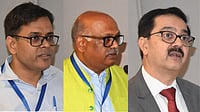What is your daily unavoidable brush with plastic?
There are certain aspects of plastic that are absolutely unavoidable. For example, you cannot avoid the essentials that are packaged in plastic. In any case, it is used keeping safety and health regulations in place. The second thing is the packaging that comes with products that people buy online. I try to recycle this packaging as much as possible. Other unavoidable items are cleaning agents, and I am working with partners to recycle the plastic used for them.
What plastic alternatives do you use in day-to-day life?
As a family, we never buy fruits and vegetables that are wrapped in plastic. All our shopping bags are made of cloth and are reused. We get milk glass bottles that are recycled. We have switched to recyclable and compostable garbage liners. I have made the switch from regular to compostable sanitary napkins. My child’s diapers are completely compostable and natural.
What other changes do you bring to the life of your child?
He does not have a single plastic toy. All his toys are made from natural materials. Down to his milk bottles, everything is either glass or steel. All of it is reusable for many years, and I pass on everything he has outgrown to children who need it.
A lot of the essentials that we needed when he was born were given to me by a friend who had had her baby a year before I had mine. So, I am also as a mother trying to reduce unnecessary and wasteful consumption, even when it comes to my child.
I have invested in a company called Shumee which offers completely non-toxic sustainable Montessori toys for children. That is another way to combat the problem. If we have the money, we need to start investing in companies that are making better choices.
You had a plastic-free wedding. What was it like?
It is an extension of trying to keep life as free of single use plastic as possible and managing the plastic waste that is created. We ensured that there were no plastic water bottles. None of the décor had elements of plastic in it. We ensured that everything was natural and, if it was not, it had to be recyclable. There were no printed wedding cards.
Then there are all these things that people give which have so many layers of plastic packaging. In parties as small as of 20 people at home, how difficult is it to just keep jugs or glass bottles of water? Such conscious measures go a long way. I guess convenience is the biggest lie we tell ourselves because that is what is causing all the damage.
Alternatives to single use plastic are expensive.
The alternatives last longer. The long-term cost is much lower. Honestly, it is cheaper to buy fruits and vegetables that are free of packaging because then it means that you are buying local fruits and vegetables from neighbourhood vendors. It ensures a healthy planet as well as healthy people. It also helps the local economy and impacts all SDGs. Positive impacts are tremendous when we make more sustainable choices and single use plastic-free choices.
Women are more exposed to plastics due to use of cosmetics and sanitary napkins. What will you say to them?
The good thing is that many cosmetic companies are now taking back the containers and offering discounts. So, I think it is about personal discipline. Compostable sanitary napkins may not be accessible or affordable to many, but these are safe and healthy choices that are sustainable.
Menstrual cups are washable and reusable. These are a lot more inexpensive than sanitary napkins because of their longevity. There are many women who continue to use cloth or cotton. As long as the cloth is natural and cleaned, well-washed, dried in direct sun and ironed with a hot iron and changed frequently, it still remains a more sustainable choice.
There is an opinon that alternatives like bamboo straw and paper bags are environmentally unfriendly.
Instead of using a straw, sip the drink. If you already have a plastic bag, please keep reusing it. If you want to be truly sustainable, there are many ways you can adopt. We need to consciously change our patterns of consumption. The first and the most fundamental thing that we should is to reduce our need for more. Do not continuously purchase more new things to replace old things. We need to stop being wasteful. If you have a cloth bag, reuse it. A cloth bag can last for years if managed well. I think the biggest step that we all can take is to reduce our consumption, which in itself will be a much more sustainable practice.
What is your take on use of plastic in clothing?
The unfortunate thing with converting plastic into wearables is that when you wash these clothes, plastic microns go into water, which nobody is going to remove. And it makes its way into our and our babies’ blood stream. So, I am not a fan of using plastic or allowing the recycling of plastic in any kind of items that have to be worn and washed. A lot of the ocean pollution is because of a complete mismanagement of waste. The first step is to manage our waste at home with basic segregation and composting the wet waste, and ensure that everything that is recyclable is sent to the correct windows, so that the load on the landfills is better managed.
We need to start working more with governments and municipalities to ensure that we have better waste management systems and management infrastructures.
Can sustainable plastic be considered the answer?
This is a fantastic intervention for some industries. For example, toys and garments need to be packaged in something that can make them waterproof for transportation purposes. So the protection of the product is obviously going to always be a priority for the manufacturers. In such cases, replacing regular plastics with natural plastics that are compostable and completely free of any kind of toxins and chemicals is a fantastic initiative. I really hope it grows because a lot of the companies that I deal with are using this form of packaging.
Is it possible to lead a plastic-free life in the 21st century?
If we believe, we can. I hope we do, because we all know that it is causing devastation and destruction and, most importantly, it is destroying human health. We have to find out the alternatives and ways to keep our lives free of single use plastics and wasteful plastics.
What is your message to all?
Action is the magic word. I hope to continue to make better choices for people and the planet. We have to keep working with governments. We have to stop waiting for somebody else to fix the problem.































